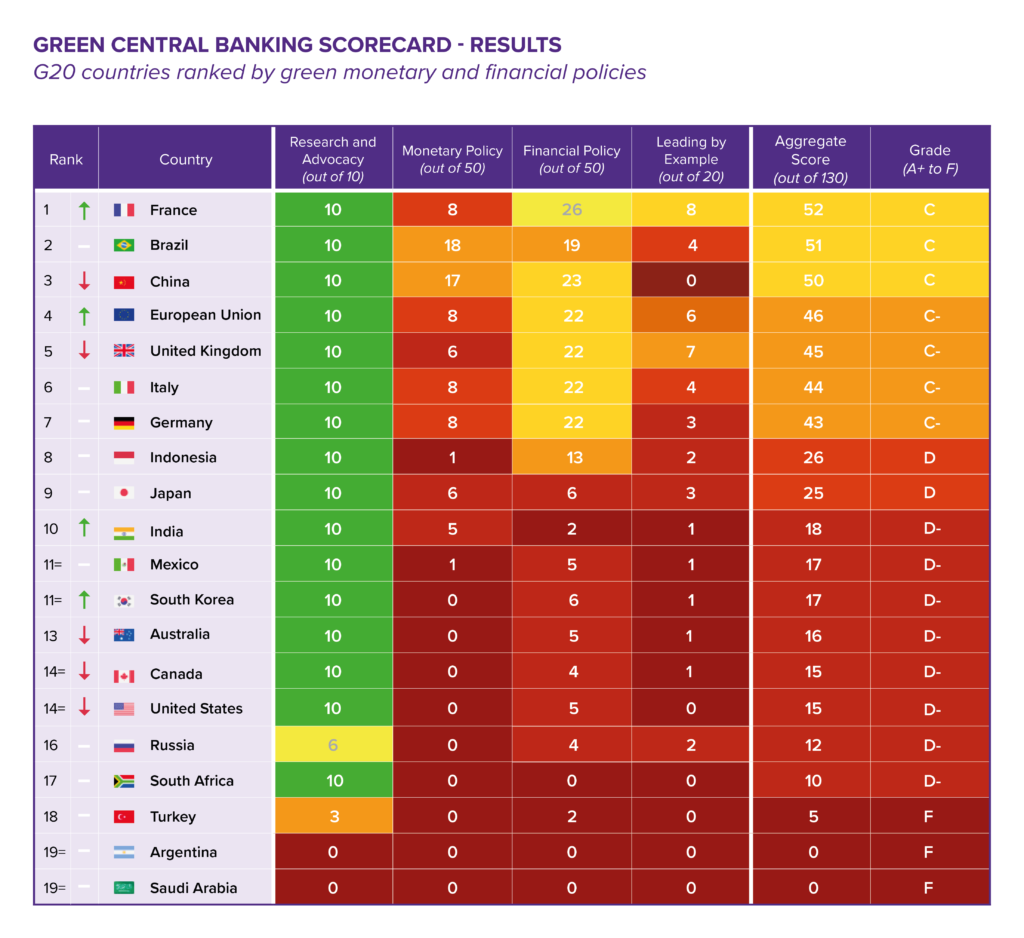Still too many promises and not enough action from G20 central banks

November 2, 2021
With the ‘Finance’ day at COP26 approaching, have the world’s biggest central banks and financial supervisors stepped up to the plate on climate? Far from it — we’re keeping tabs with an update to our G20 green central banking scorecard. China lost its top spot to France, the UK slipped behind the EU, and the US fell further behind as India gained ground.
In March 2021, Positive Money launched the first edition of its Green Central Banking Scorecard, which evaluates and ranks G20 countries’ monetary and prudential authorities based on their green policies and activities. This was the first ever green ranking of central banks and financial supervisors, endorsed by 24 organisations and institutes internationally. The scorecard, which showed that central banks and financial supervisors were all talk and no action on climate, received media coverage in Reuters and media outlets in well over a dozen countries, including the US, China, South Korea, France and Switzerland.
Ahead of the G20 Summit and the COP26 climate conference, Positive Money released an update to the interactive version of our scorecard hosted by Green Central Banking. Although green finance has climbed up the political agenda, our updated results show that progress in implementing green monetary and financial policies has been all too slow. Not a single central bank has received an overall grade above a ‘C’, but there have been major movements across the board, showing who is starting to step forward and who is falling further behind.

France takes top spot, and China drops to 3rd
France has taken the top spot in the ranking, following the European Central Bank’s (ECB) release of its climate action plan, publication of its climate stress test results, and consideration of ambitious measures including climate capital rules, restrictions on banks’ portfolios, and transition plans for financial institutions. While Germany and Italy also gained points thanks to these developments, the Banque de France marks itself out from its European counterparts primarily due to its Responsible Investment Charter, which includes a phaseout of fossil fuels investments in its own portfolios.
As France has taken a step forward, China has taken two steps back. At the launch of the first edition of the Scorecard in March, the People’s Bank of China (and the China Banking and Insurance Regulatory Commission) were continuing to build on a long history of green finance policies. However, in recent months, China’s regulators have taken a significant detour by guaranteeing finance towards new domestic coal production, resulting in a temporary suspension of points for its previous policies guiding credit away from unsustainable activities. While China’s announcement that it will end foreign coal investment is undoubtedly a positive development, this commitment needs further clarification.
UK slips into 5th as EU takes 4th
Despite receiving its green mandate, the UK has slipped from 4th to 5th position in the ranking, failing to keep up with progress in the EU. While the Bank of England is moving forward with plans to decarbonise its corporate bond purchase scheme and is now more seriously considering climate capital rules, the ECB is a step ahead, as it has committed to incorporating climate considerations into its collateral framework and is considering even more interventionist prudential policies than the Bank of England (as mentioned above).
With its new remit to support net zero and environmental sustainability, the Bank of England should be leading the way, especially as the UK welcomes the world’s leaders to Glasgow for COP26. To reclaim its position ahead of Europe, the UK must not hesitate to exclude and penalise fossil fuel and other environmentally risky assets in both its monetary operations and financial policies.
The US falls further behind as India gains ground
As the world’s most systemically powerful central bank, it’s crucial for the Federal Reserve to step up to the plate on climate. US Democrats have already scolded Jerome Powell for the Fed’s poor performance in the first edition of our scorecard, calling for him to be replaced by a Chair that would take climate risk seriously. Our latest results show that Powell has continued to drag his feet, causing the Fed to further plummet towards the bottom of the rankings. While central banks at the top of the leaderboard are moving towards or already using monetary and financial tools to account for climate risk and align finance with environmental goals, the Fed is still discussing how to assess these risks, as demonstrated in US regulators’ latest report.
The Reserve Bank of India (RBI) was unique among laggards in the first edition of our scorecard, as it had a green credit guidance policy but scored poorly overall, even on research and advocacy. Now that the RBI has joined the Network for Greening the Financial System and is considering climate stress tests, India has jumped into 10th place, leaving the US far behind in joint 14th with Canada.
While this update shows some positive progress on climate among G20 central banks and financial supervisors, it remains far too slow. As we continue to keep score of these institutions’ green policies, we expect to see further movement towards high-impact policies that will divert finance away from fossil fuels and other environmentally harmful activities. Failure to do so would leave both financial and environmental stability at greater risk across the world.